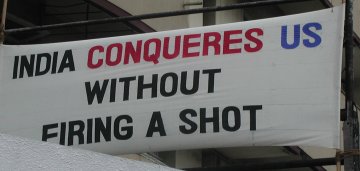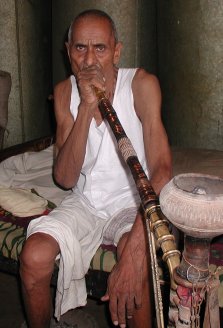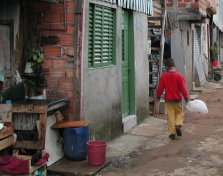

House of Sound
BRICS Programme Two






House of Sound
BRICS: The Rise of Brazil, Russia, India and China
Programme Two: The BRICs Today
Naresh Goyal is one face of the New India. The founder of one of India's fastest-growing private airlines, Jet Airways, Goyal is surfing the crest of the BRICS wave. He tells presenter Peter Day of his plans for flights to Brazil, China, and Russia, as well as to a host of European destinations.
Goyal is one player in what the economist and Nobel laureate Michael Spence calls the start of a dispersal of economic power and influence in the world. Already, he says, countries like China, India and Brazil are beginning to punch above their weight in such global forums as the WTO.
In a darkened disco in Mumbai, lithe figures dance to a throbbing techno beat in a mist of dry ice. Film-maker Prahlad Kakkar (left) is shooting a commercial for a new men's hair cream. Kakkar is frank about his work: "We are part of a process which is converting a relatively agrarian economy to a consumer economy," he says. "And I don't know if that's a good thing or a bad thing." The product's brand manager, Sameer Satpathy, has no such qualms: "If you don't move forward, you die," he says. "That's the basic rule of capitalism." His sales figures chart the rise of what CK Prahalad has called The Fortune at the Bottom of the Pyramid: Five years ago, Satpathy says, this cream would only have been sold in a few department stores or boutiques in India's biggest cities; now, it's being marketed in towns across the country. In just five years, Satpathy says, products like this have become accessible to an exploding middle- and lower-middle class.
But will everyone be able to live out these dreams of abundance? In the village of Tilpat, outside Delhi, 70-year-old Badleram (below, left) smokes his hookah and wearily explains that politicians' promises have yet to result in paved roads or a constant electricity. Hundreds of miles away, though, in a polystyrene hut in Mumbai, 18-year-old Remeeb says she's happy with the dollar or so a day she makes building roads for India's new cars: she's able to take the money back to her husband's village, two days' travel away, and plant better crops
Indeed, Peter Day detects a spirit of optimism in all of the BRICs countries. The courageous journalist Hu Shuli, founder-editor of the financial newspaper Caijing, says Chinese business is moving closer to the western model, despite persistent complaints of corruption. Russian entrepeneur Sergey Vykhodtsev says he's betting his money on his country's economic future. Even Tarun Tejpal, editor of the muck-raking online newspaper Tehelka, says he thinks his country's in great shape -- and believes India is well-positioned to overtake China which, he argues, hasn't yet had to weather the shock of democracy. In Brazil, the music producer Guga Stroeter is exuberant about his country's burgeoning economic and political fortunes:
"What I feel is that the leadership of many places are really stupid," he says. "I feel that what Blair does with Bush is ridiculous, what Bush does is ridiculous, and that Berlusconi is ridiculous... So I don't feel so inferior, like I used to feel!"
The veteran Brazil-watcher, Norman Gall (bottom left), founder of the Fernand Braudel Institute of World Economics in Sao Paolo, says that kind of exuberance will help power Brazil and other young, vibrant societies ahead of such tired, ageing societies as Europe and, to a lesser extent, America. Already, Gall says, life in the favelas, the slums, where his Institute operates, is beginning to improve. Day wonders if Europeans and Americans might find the process of being overtaken to be painful. "This has always happened in the history of the world," Gall says. "People adapt."
"But readily? Psychologically, they adapt?" Day asks, adding: "I suppose the British empire got used to fading..."
"They did, didn't they?" Gall replies.